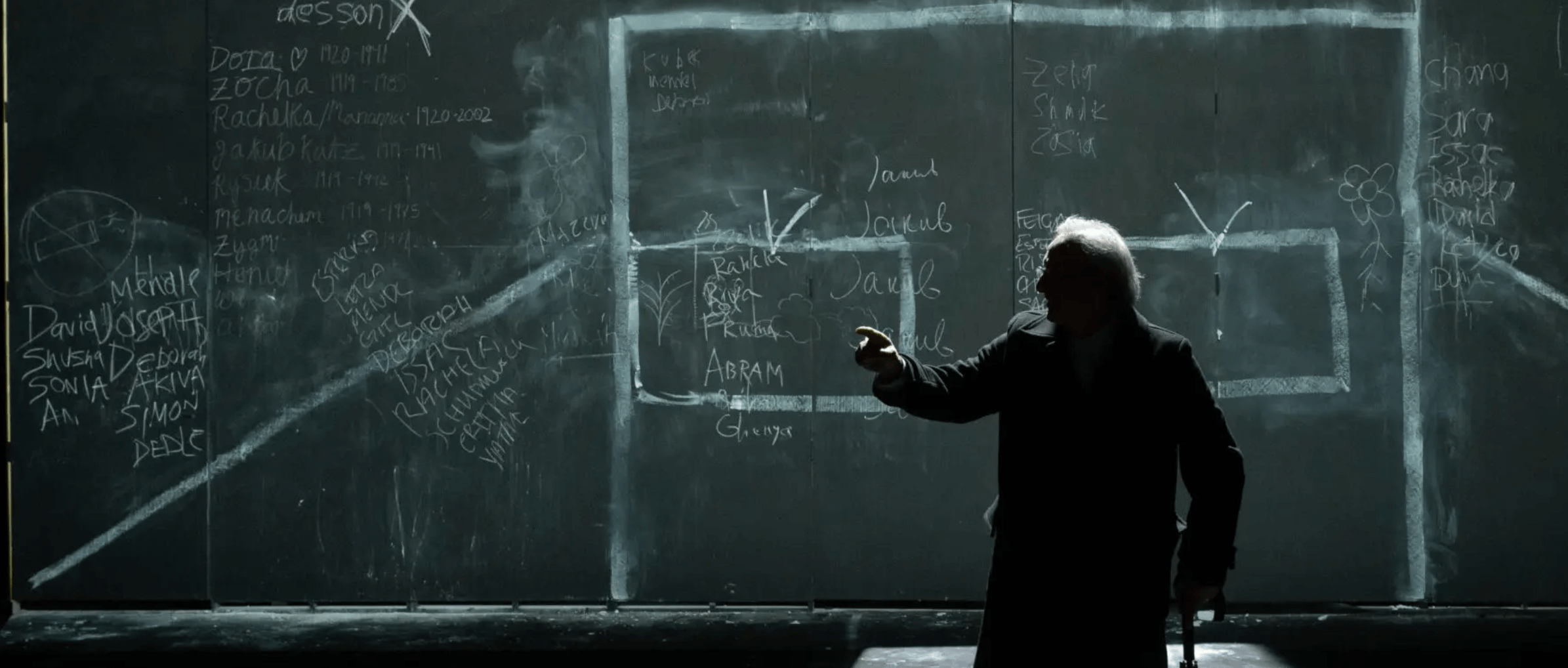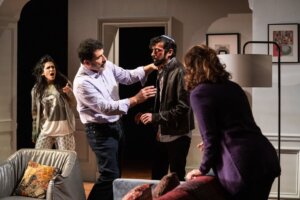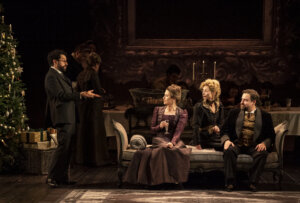In play after play, artists keep asking the Jewish question to which there is no answer
From ‘Diary of Anne Frank’ to ‘Leopoldstadt,’ ‘Our Class’ and ‘Prayer for the French Republic,’ a struggle to explain the scourge of antisemitism

Richard Topol in Our Class. Photo by Pavel Antonov
In Simon Schama’s seminal two-volume The Story of the Jews, a line in what amounts to a historical litany of atrocity hit me with seismic force: “For the Jews,” Schama wrote, “safe havens are always provisional.”
It was the present tense in Schama’s observation that shook me, a recognition that in century after century, violence has driven the Jewish people out of purported places of security. A perilous continuum seems to be a Jewish inheritance, one that we always want to believe has a certifiable end date. But like the wanderers of Samuel Beckett’s masterpiece, Waiting for Godot, we wait, and wait, and wait, for salvation.
These thoughts have been running through my mind of late, as events in the Jewish world have grown more anguishing and threatening — and the world of the stage has been seeking to understand them, too. Although Jewish trauma has long been a theme for contemporary theater, going back to plays like 1955’s The Diary of Anne Frank, the subject has acquired a new and potent relevance that has been captivating audiences on Broadway and beyond.
Tom Stoppard’s Leopoldstadt, a fictionalized account of the tragic impact and aftermath of the Holocaust on a Viennese Jewish family, was a sensation of the 2022-23 season on Broadway, winning the Tony Award for best play: it ran for more than 300 performances, a stunning testament to durability for a new drama these days. On its heels this season have come other compelling works, original and in revival, that speak to an avid yearning for reckoning with Jewish suffering in the 20th and 21st centuries.

Is it possible, though, for theater to do more than respond to the defiant cry, “Never again?” In the poignant Prayer for the French Republic, for instance, now on Broadway at the Samuel Friedman Theatre, playwright Joshua Harmon explores the multi-generational fallout of antisemitism convulsing a Parisian Jewish family in 1944 and 2016. And Our Class, in a riveting production directed by Igor Golyak that closes Sun. Feb. 11 at the Brooklyn Academy of Music, dramatist Tadeusz Slobodzianek records the fates of 10 Polish classmates, five Jewish, five Gentile, as the Nazis recruit some of them, murder others, and upend the existences of them all.
Neither play portrays real-life witnesses to the horrors, but both are acts of witnessing; Harmon’s play debuted off-Broadway at Manhattan Theatre Club in 2022; Slobodzianek’s work, adapted from the Polish by Norman Allen, was first performed in 2008. Like Leopoldstadt, Prayer and Our Class make vigorous claims on our hearts; in its painstaking chronicle of each of the students over the course of 50 years, Our Class, in particular, comes across as an astonishingly comprehensive document. Its Jewish characters variously become refugees or converts to Christianity or victims of genocide; the Gentiles are saviors or silent collaborators or Nazi stooges.
We’re told that theatergoers, afflicted with current-events fatigue, are looking primarily for escape nowadays. So what accounts for the critical and box office success of these somber and probing ventures? It bears noting that in the Jewish community— long a backbone of theater support and attendance — some contradictory impulses must be at play. Without being privy to demographic breakdowns, I’d wager that Jews have made up a significant portion of ticket buyers for these productions; other recent shows, including the musicals Parade and Harmony, and Alex Edelman’s comic monologue, Just for Us, tapped with varying degrees of success into the rich tradition of Jewish characters and themes on Broadway. For at the same time that we need an entertaining break from reports of war in the Middle East and the rise of religious and ethnic hatred at home, we’re also consolingly braced somehow by communing with the terrible burdens of our forebears.

At least, I am. And it is the lesson of endurance, of the uncanny survival of a persecuted tribe, that one takes away from these dramatizations of Jewish trauma. “In 1549,” Schama writes, of just one of the endless pogroms and banishments the Jews of Europe faced, “the New Christians [Jews who’d been forced to convert] would be expelled from the city whose immense riches they had made. A half-century of religious violence, war, siege and massacre would follow, which gave any Jews watching from afar no satisfaction.”
In Prayer for the French Republic, our watching occurs close in, as the story ricochets between the Benhamous, a family in Paris in 2016, and their ancestors, the Salomons, in occupied Paris in 1944. The elderly Salomons, played splendidly by Daniel Oreskes and Nancy Robinette, somehow manage to ride out the war in their apartment, even as their children and grandchild are sent to concentration camps. The Benhamous, though, have the option of escape to Israel: their kippah-wearing son Daniel (excellent Aria Shahghasemi) has been set upon by thugs in a modern-day Paris increasingly hostile to Jews.
It’s as if Harmon and director David Cromer channel Schama’s insight: Even the safety of a liberal democratic society in the 21st century is provisional. The structure of Harmon’s play — which runs for more than three hours, with two intermissions — is a bit unwieldy, and employing a member of the Salomon branch of the family, played by Anthony Edwards, as narrator feels like one theatrical device too many.
Still, the play fortuitously meets this moment in history, flipping a switch for any Jew — of any political stripe — who has ever felt that isolating sense of being the other. Would you be better off in a majority-Jewish country? The debate between the Benhamou parents, Marcelle and Charles (the terrific Betsy Aidem and Nael Nacer), rages on: Stay or go. Their brilliant, troubled daughter Elodie (an equally wonderful Francis Benhamou), meantime, has news for their young, visiting relative from the U.S., nicely assayed by Molly Ranson: American Jews cannot really grasp what the Jews of Europe have borne, and continue to bear.
That’s fair, and maybe helps explain why these plays are doing so well. As diverse and assimilated as the Jewish community has become in this country, many of us feel a need to connect more deeply, to live in the shared hard reality of our eternal provisional condition.
Slobodzianek’s Our Class, like Stoppard’s Leopoldstadt, begins in the 1920s, in a period of what seems like peaceful social absorption. We first encounter the Christian and Jewish characters as young children, indistinguishable by background, singing a Polish folk song in class. Golyak, the director, in concert with set designer Jan Pappelbaum, comes up with an ingenious visual conceit: a vast wall onto which names and dates and events are scribbled. A record of ordinary lives and minor events in a little village, one whose tragedies could easily be erased, without a playwright to memorialize them.
The progress of the 10 lives, hardened by cruelty or cushioned by kindness, is handled so deftly by the dramatist, the adapter and director that you’re drawn inexorably into the story of how each of the characters fares. That they are fully realized is a tribute to the play’s gifted ensemble. The mystery of what obliterates benign acquaintanceship, and forces half the class to reset their impression of the world, from comforting to terrorizing, is never explained. It’s the unknowable in drama, as it is in history. A character in Prayer for the French Republic poses the question that perhaps gnaws at many in the audience on powerful nights like this, and many others: “Why do they hate us?” It’s the obligation of art to keep asking.






















